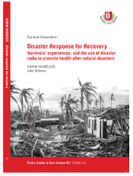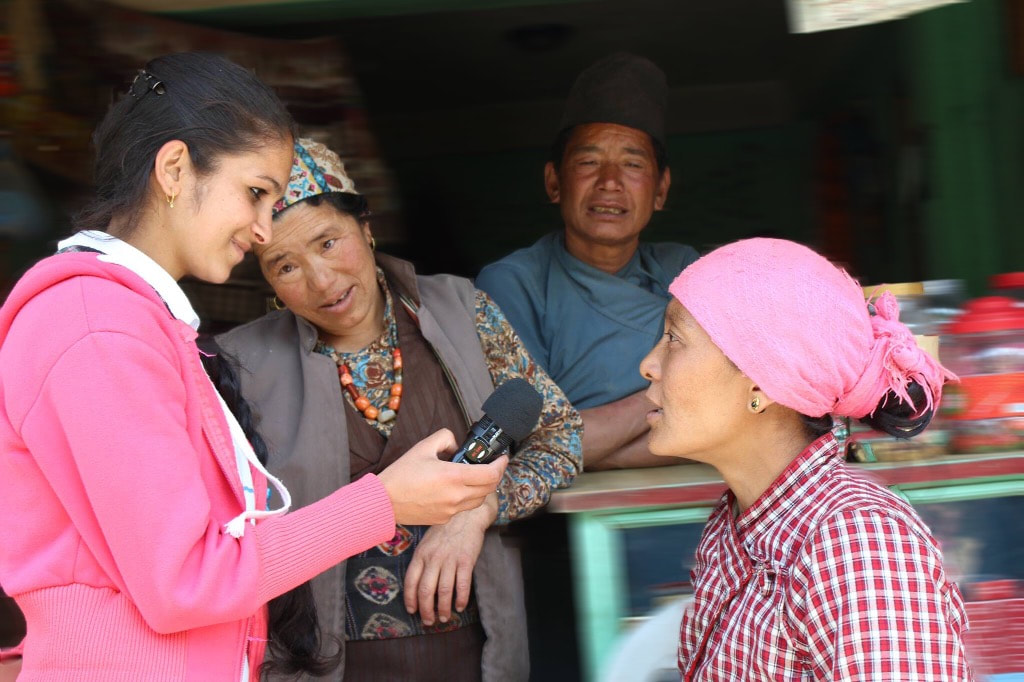|
|
Some people have argued that radio is a dying medium, but it’s only become more popular and will continue to be a powerful tool for community-based communications in and outside of humanitarian contexts." Leonard Doyle, Director of Media and Communications, IOM |
Your browser does not support viewing this document. Click here to download the document.
Some people have argued that radio is a dying medium, but it’s only become more popular
and will continue to be a powerful tool for community-based communications in and outside
of humanitarian contexts." Leonard Doyle, Director of Media and Communications, IOM.
|
Following Typhoon Haiyan/Yolanda in the Philippines in November 2013 all radio and TV stations were off the air in Tacloban City, the “ground Zero” area of the disaster. FIRST Response Radio (Philippines), a member of CDAC (Communicating with Disaster Affected Communities) arrived on Day 5 and by the next day had an emergency radio station on 98.7FM broadcasting from the top of City Hall, which ran for 6 weeks.
FIRST Response Radio (Philippines), a member of CDAC (Communicating with Disaster Affected Communities) arrived on Day 5 and by the next day had an emergency radio station on 98.7FM broadcasting from the top of City Hall, which ran for 6 weeks. |
|
|
|
|
First Response Radio has been working in many Asian countries over the past 10 years, training teams to respond to disasters by setting up radio stations using the unique 'radio-in-a-suitcase' equipment, broadcasting essential information to the affected communities quickly. It is anticipated that teams will soon be trained in other disaster prone areas of the world.
|
LATEST NEWS - Pakistan
Training of Trainers took place in Pakistan in July 2019. The FRR Pakistan team is now equipped to run their own FRR training as well as responding to disasters. |
Click here for latest quarterly report
LATEST NEWS - Pakistan
Training of Trainers took place in Pakistan in July 2019. The FRR Pakistan team is now equipped to run their own FRR training.
|
|
LATEST NEWS - Pakistan
Training of Trainers took place in Pakistan in July 2019. The FRR Pakistan team is now equipped to run their own FRR training. |
Once a team has been trained and equipped, they are ready to deploy in the event of disaster in their local area or country. They aim to be on air within 72 hours. The decision to deploy should happen within the first 24 hours, travel to the area during the second 24 hours and set-up in the third 24 hours.
The decision to deploy will be taken by each FRR team, in consultation with their partner organisations. It will depend on many factors, including:
The decision to deploy will be taken by each FRR team, in consultation with their partner organisations. It will depend on many factors, including:
- Is there a significantly affected community without resources or lacking information? (How many displaced persons rather than how many deaths. Is it more than 100,000?)
- What is the level of chaos and local disruption?
- Has the National Government asked for international/UN help?
- What is the predicted recovery time? More than 1-2 years?
- Is the local power still on? How long till it is restored?
- Are Radio/TV off air? If stations are still broadcasting are they providing useful critical information?
- Is there a deployable team of at least 3-4 people, not just trained but able to deploy in less than 24 hours?
- Is the kit locally available? If not, can one be borrowed from another team?
- Is there an available supply of radios for distribution?
- Are there tents, supplies, local language speakers, drivers etc available?
- Is there anyone – local or deploying partners – who can offer logistical support?
Partner with First Response RadioFirst Response Radio plans to equip and train teams in 4 new disaster-prone countries over the next 2-3 years.
To partner with FRR in this venture contact: Mike Adams, FRR International Co-ordinator through the contact form below. |
|





















